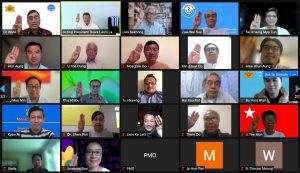Myanmar’s shadow National Unity Government (NUG) is preparing to unveil a budget of $700 million after months of concerted fundraising efforts, according to a report published by Nikkei Asia yesterday. The report, written by Gwen Robinson and Rory Wallace, reveals a number of interesting details about the NUG’s efforts at raising funds to oppose Myanmar’s military junta.
The NUG was formed in April by members of the ousted National League for Democracy (NLD) government, ethnic minority representatives, and civil society leaders, to act as a locus for opposition to the military junta that seized power in February and to compete with it for international recognition.
In addition to funding the NUG’s day-to-day operations, this pool of funds, which is held mainly in accounts outside the country, is intended to support humanitarian relief, provide COVID-19 vaccinations, and support workers who have walked off the job as part of the Civil Disobedience Movement against military rule.
According to the Nikkei Asia report, the NUG’s fundraising efforts have taken a number of forms. These include crowdfunding from the Myanmar public, tapping wealthy overseas Burmese for donations, and setting up a covert lottery, known as “Victorious Spring,” which has been wildly popular. Indeed, when the lottery was first launched last month, its tickets sold out in just over an hour, despite the junta threatening to punish anyone who purchased a ticket. It is now expected to bring in about $8.4 million per month, according to the Nikkei Asia report.
According to the report, the NUG was set to update its first budget in July, but the date was pushed back “due to internal debates over shifting priorities,” particularly the question of support for the civil disobedience movement and COVID-19 relief efforts.
In addition to making a bid for recognition as Myanmar’s legitimate government, the NUG is lobbying foreign governments to cut funding flows to the military regime while pressing foreign investors to divest from military-linked businesses. (Yesterday, the German cash-and-carry chain Metro, became the latest foreign firm to announce its withdrawal from Myanmar.) The shadow government says it is also “making progress” in efforts to retrieve $1 billion of Myanmar’s foreign reserves that were frozen by the U.S. government shortly after the military takeover.
While the NUG’s $700 million budget falls far short of the budget of which the military government has control – last August, the NLD-dominated parliament passed a budget of some $20.7 billion for the fiscal year to September of this year – it is impressive, especially considering that the NUG controls no territory and lacks any formal tax base. That most of the money has been raised from a Myanmar population who have been pressed by the country’s twin crises – the coup and the coronavirus – is a remarkable signal of the depth of the animosity that many feel toward the Tatmadaw and its cloistered senior ranks.
The Nikkei Asia report also includes comments from NUG Finance Minister Tin Tun Naing, who said that the parallel government is pursuing a strategy that aims to capitalize not just on the military junta’s deep unpopularity, but also its failures to provide basic services, including COVID-19 vaccines (of which the NUG claims to have some 6 million), to most of the population. Given the extent of the new regime’s apparent economic delusions, there will be plenty to work with.
The report also includes the telling detail that the regime’s own recovery plan is lifted more or less wholesale from policies past by the civilian government that it ousted. The junta “is so bereft of ideas it has resorted to stealing some ideas from the original NLD reform plans,” Tin Tun Naing told Nikkei Asia.
The NUG faces many challenges in gaining international recognition, let alone unseating the Tatmadaw and overthrowing its self-described “caretaker government.” But the revelation that it has access to $70 million in funds suggests that it has enough resources to create a lot of problems for the junta. While it is unlikely to win outright, the anti-coup opposition has more than enough support and resources to prevent a full consolidation of February’s coup d’etat and ensure that the fight for Myanmar’s future will be one not of months but of years.

































